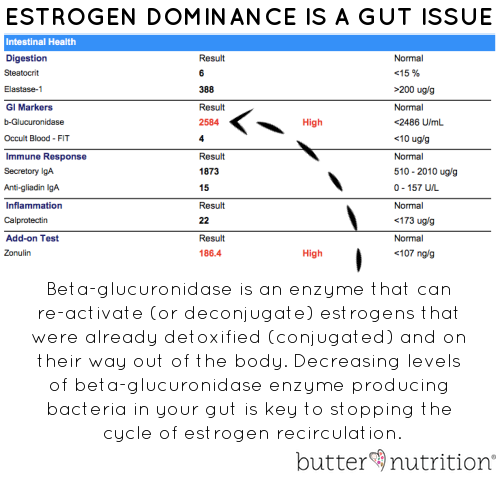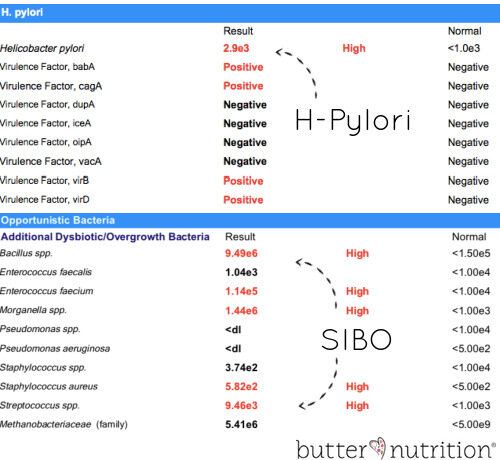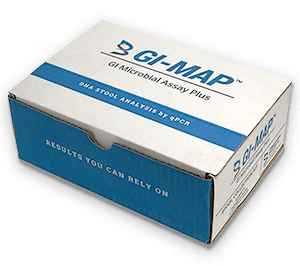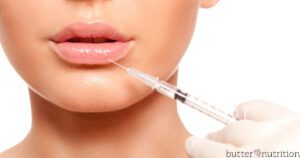 Got acne? Weight gain? Tired all the time? Can't digest certain foods? Hormonal symptoms?
Got acne? Weight gain? Tired all the time? Can't digest certain foods? Hormonal symptoms?
Your gut could be the source of your issues, and commonly is based on my work with hundreds of clients around the world.
Today I want to share with you 8 ways a stool test can explain your symptoms, so you can finally get to the root cause of your issues!
Weight gain
Weight gain is largely tied to gut and liver health. Gut dysbiosis can be the cause of bloating, water retention, and estrogen dominance, all which typically cause an increase in pounds. The three specific markers I look at for assessing if weight gain is being caused by gut issues are:
- Low Akkermansia Muciniphila
Akkermansia Muciniphila (A. muciniphila) is a mucin-degrading bacterium naturally found in the human gut that is associated with obesity, diabetes, inflammation, and metabolic disorders. [1] According to a 2017 study, "Since its discovery in 2004 by Derrien et al. (2004), A. muciniphila has quickly become a popular research topic due to its newly discovered probiotic properties. The bacterium is more abundant in the gut of healthy subjects than in that of diabetic and obese patients and patients with bowel diseases and metabolic disorders. Recent intervention studies also confirmed an inverse correlation of A. muciniphila abundance with body weight, inflammation, metabolic syndrome, and both type 1 diabetes and type 2 diabetes. Collectively, the increasing body of evidence from animal and human studies suggest that A. muciniphila is a highly promising probiotic, especially its potential for the prevention and treatment of diabetes, obesity, and their associated metabolic disorders, which is of great interest for future research and development." [1] - High Firmicutes to Bacteroidetes Ratio
Research over the last few decades has identified certain human gut microbiota or "fatbugs" that can increase the caloric energy harvest from the foods you eat. Bacteroidetes and Firmicutes bacteria are two classifications of gut flora that are used to characterize the composition of the microbes in your gut. Research has found a high ratio of Firmicutes "fatbugs" to Bacteroidetes "thinbugs" (F/B ratio) in obese subjects when compared to the F/B ratio of lean subjects. They also saw that as obese subjects lost weight, the F/B ratio decreased. - High Beta-Glucuronidase (hinting at estrogen issues)
High beta-glucuronidase is a dead giveaway for estrogen dominance-related weight gain. You see, an imbalance of gut bacteria can cause estrogen dominance through the re-circulation of estrogens. This is because certain types of gut bacteria produce beta-glucuronidase enzymes that can re-activate (or deconjugate) estrogens that were already detoxified (conjugated) and on their way out of the body. Decreasing levels of beta-glucuronidase enzyme producing bacteria in your gut is the key to stopping the cycle of estrogen recirculation. [6]High beta glucuronidase can also cause PMS-like symptoms.
Skin issues (acne, eczema)
Mood problems
Did you know your gut impacts your mood in big ways?
Specifically, there's three main ways that are well-documented by research:
- Too much Lipopolysaccharide Endotoxins (LPS) Create Inflammation - Inflammation caused by LPS leads to:
- slowed production of S-adenosyl-L-methionine (SAMe) a molecule made in the body that acts as a natural serotonin reuptake inhibitor.
- Pro-inflammatory events contribute to behavioral alterations like anxiety, depression and cognitive dysfunction.
- Altered Serotonin Production - Consider 95% of serotonin is manufactured in the gut by your gut bacteria. Stress and LPS/endotoxin (from an overgrowth of gram negative bacteria, think antibiotics, PPIs, processed food diet) shunts tryptophan (an amino acid found in your proteins) from being made into serotonin, and instead shuttles it down the Kynurenine pathway towards neurotoxic quinolinic acid.
- B vitamin Production Alteration - Poor gut health leads to a decrease in beneficial bacteria that manufacture b-vitamins, specifically bifidobacteria and lactobacillus.
Want to dive deeper into the mood:gut connection? Look no further than this article.
Blood Sugar
Did you know that blood sugar issues like insulin resistance and type 2 diabetes are linked to imbalances in your gut? [19, 20]
Fatigue
Fatigue is all too common when it comes to chronic infections in the gut. When your system is constantly coping with underlying infections, it uses up your body's bandwidth so-to-speak, leaving less energy for other metabolic processes.
Constipation
An overgrowth of pathogenic bacteria and biliary insufficiency are huge triggers for constipation. The key to resolving chronic constipation is reestablishing healthy bile flow, microbiome balance in the gut, and supporting peristalsis.
Bloating
Bloating is often the results of biliary insufficiency (poor bile flow and/or inability to digest your fats), pathogen overgrowth, and general microbiome imbalances. With proper testing and supplementation, I've seen dramatic changes in bloating severity in just a few days. You do not have to live with bloating, you just need to understand why it's happening (so you can do something about it).
Diarrhea
Diarrhea is a dead giveaway for bacteria overgrowth. You see, certain microbes when overgrown can create something called secondary bile acids (particularly Clostridia, Enterococcus, Enterobacteriaceae, Klebsiella, and Lactobacillus). Typically bile is reabsorbed and recycled within your small intestines, but secondary bile acids do not get reabsorbed in the intestines and move into your colon (where they aren't supposed to be) causing diarrhea and inflammation. [10]
Acid Reflux
Stool testing checks for the presence of a Helicobacter pylori infection (commonly called h-pylori). A H-pylori infection of the stomach suppresses stomach acid secretion, and is extremely common. [11] In fact, it comes back on most of the GI Map (stool tests) I run on my clients. It's estimated that over 50% of the world is infected with this chronic bacterial pathogen, and the research between h-pylori and gastroesophageal reflux disease (GERD) is very strong. [12-14]
What's going on in your gut?
The first step to seeing real change in your body is understanding what the problem is.
Without knowing what is going on, you're just taking shots in the dark and hoping to get lucky.
If you're ready to get to the root of your issues instead of just chasing the symptoms, a GI Map test is the way to go. I typically pair this test with 3 months of support to help my clients gain control of their gut and find lasting change.
The GI Map test is shipped straight to your door and you can complete it in the comfort of your own home (I can even have it shipped outside of the US). The kit includes 2-day return shipping back to the lab. Results take about 2-3 weeks to process from the mailing date.
Interested to see what all is tested? View sample results here.
I hope this gives you more insight into possible causes of your most annoying and persistent symptoms.
PIN IT:
References:
- https://www.ncbi.nlm.nih.gov/pmc/articles/PMC6223323/
- https://pubmed.ncbi.nlm.nih.gov/31336737/
- https://www.ncbi.nlm.nih.gov/pmc/articles/PMC5933040/
- https://www.ncbi.nlm.nih.gov/pmc/articles/PMC4644874/
- https://www.diagnosticsolutionslab.com/sites/default/files/gi-map-white-paper_2.pdf
- https://www.ncbi.nlm.nih.gov/pmc/articles/PMC5017946/
- https://www.apa.org/monitor/2012/09/gut-feeling
- https://www.ncbi.nlm.nih.gov/pmc/articles/PMC4259177/
- https://www.ncbi.nlm.nih.gov/pmc/articles/PMC6678709/
- https://rebelhealthtribe.com/acid-reflux-h-pylori-ulcers-upper-gi-solutions-2/
- https://pubmed.ncbi.nlm.nih.gov/9207257/
- https://pubmed.ncbi.nlm.nih.gov/8547526/
- https://europepmc.org/article/med/11873099
- https://www.ncbi.nlm.nih.gov/pmc/articles/PMC6502218/
-
https://pubmed.ncbi.nlm.nih.gov/16965415/
-
https://www.ncbi.nlm.nih.gov/pmc/articles/PMC7350295/
-
https://www.ncbi.nlm.nih.gov/pmc/articles/PMC6678709/
-
https://www.ncbi.nlm.nih.gov/pmc/articles/PMC6042414/
- https://pubmed.ncbi.nlm.nih.gov/21636801/
- https://diabetesjournals.org/diabetes/article/56/7/1761/12590/Metabolic-Endotoxemia-Initiates-Obesity-and











Mary Felgate says
Catherine,
I love reading all your blogs - they all make sense…. the older I get, particularly caring for my 90 year old mother and accompanying her to her many medical appointments, I am afraid the medical profession leaves me cold and sceptical.
You, together with Ray Peat and Broda Barnes are proof there is so much more to health than popping Steroids, PPis,
Statins and drugs…. Aged 63, I’ve only just discovered I had a thyroid storm, 30 years ago, which was instantly iradicated
by radioactive iodine…. I have never felt
right since, nothing has ever been explained, according to blood tests, it’s all been in my imagination! - it definitely hasn’t!
Thanks to you, I am gathering strength
In my understanding and will at some stage, try some of your tests.
Thank you once again
Margaret Manzo says
I believe both of my young grandchildren (3 and 4 years old)could benefit from gut analysis and therapy. Do you have effective remedies that can improve the gut of children who are too young to swallow capsules?
Catherine says
There are a wide variety of food-based interventions as well as some supplements can be opened and added to food or drink.
Abundantly,
Catherine
Gina says
I wish these tests were more affordable.